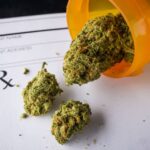Our country is in the midst of the worst opioid epidemic in history. 14,000 Americans died from accidental overdose of prescription opioids in 2014 alone, according to CDC data. In many states, these high figures made opioid overdose the leading cause of death in younger populations.
At the same time, many opioid treatments for pain are prescribed based on research from the 60s that fails to justify the use of opioids in specific cases. Therefore, the criticism that medical cannabis drug therapy trials lack the needed conclusive evidence for treatment of certain conditions could also be directed at opioids.
In the end, we at Euphoria Wellness are not licensed medical professionals and cannot advocate one therapy choice over the other for pain sufferers. However, we can share information from experts in the medical field as to why some consider medical cannabis a safer alternative to painkillers and a method for tempering the rampant overprescription and abuse of opioid-based painkiller drugs.
Cannabis as an Effective Treatment or Co-Treatment for Certain Types of Pain
An extensive review of research literature conducted by staff from the Harvard Medical School found promising results in clinical trials regarding the use of medical cannabis for the treatment of certain types of pain.
Both chronic pain and neuropathic pain responded well to treatment from smoked whole cannabis flowers as well as synthetic cannabinoids. Patients reported an improvement in their symptoms and with less side effects than many common drug treatments.
Other research suggests that even when opioids are recommended as a specific pain management therapy for patients, the addition of medical cannabis products to the treatment regimen could improve outcomes.
Most notably, one study suggested that “increasing safe access to medical cannabis may reduce the personal and social harms associated with addiction” to opioid painkillers. Another study yielded more specific results, finding that on average cannabis use was associated with chronic pain patients using 64 percent less opioids while experiencing fewer side effects and a better quality of life.
Medical Cannabis as a Treatment for the Opioid Epidemic?
Looking more broadly at the problem of abuse of opioid drugs, several states and regions have found that medical cannabis can provide an effective method for reducing overdose risk.
One doctor operating within a New England care network advocated the use of medical cannabis to temper the “statewide epidemic of opioid deaths” Massachusetts is experiencing. “As soon as we can get people off opioids to a nonaddicting substance — and medicinal cannabis is non addicting — I think it would dramatically impact the amount of opioid deaths,” the doctor asserted to The Boston Herald.
A 2014 study also found that states with access to medical cannabis saw a correlating decline in opioid overdose deaths. That correlation only strengthened over time as new programs were put in place within the study’s 1999-2010 window. Overall, there was a 24 percent average reduction of annual overdoses for all included states.
All of these research studies and expert opinions support the belief that patients grappling with temporary, chronic or neuropathic pain could benefit from the use of medical cannabis as a safer alternative to painkillers.
If you are managing a pain-related condition and have a prescription for medical cannabis from a licensed physician, you can consult with us at Euphoria Wellness on the best products to meet your needs. Call us at 702-960-7200 to schedule a consultation appointment or to arrange for free Las Vegas medical cannabis delivery to your home.
This content is not intended as medical advice. The information provided is meant to encourage cannabis education, not replace direct patient-healthcare professional relationships. Always consult your primary care physician or other healthcare provider prior to using cannabis products for treatment of a medical condition. Any statements contained herein have not been evaluated by the Food and Drug Administration. Products referenced are not intended to diagnose, treat, cure, or prevent any disease. Products are only available where the consumption of cannabis is legal.

